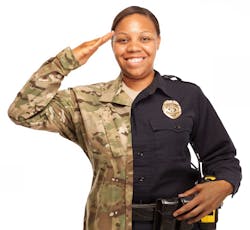The Additional Training Military Veterans may Require as a Law Enforcement Officer
This is one part of a 3 part series of hiring a military veteran as your new law enforcement officer. Additional articles can be found at "How to Hire a Military Veteran as a Law Enforcement Officer" and "Hiring a New Officer? The Embedded Skills and Benefits of a Military Veteran".
Military veterans come with great skill sets for LE roles. Even with a background that is rich in skill sets for an application to law enforcement challenges, there are areas that military veteran LE candidates will need additional training and emphasis to be successful.
■ Areas of Special Department Emphasis.
Every LE department has its own areas of special emphasis how it polices its respective territory, how it interacts with the local community, and any unique criminal challenges to its areas. These will all have to be taught to a new military veteran LE candidate. These areas will need to be over-emphasized and even re-taught to military veteran LE candidates. They may be second nature to long serving department members, but they need to be taught to all.
■ Community Interaction Role Playing.
Military veterans are used to role playing exercises how to interact with members of the Syrian, Iraqi, or Afghan population, for example. This training technique needs to be copied but it needs to be retrained to the standards of how your LE department interacts with its community. A military veteran will know the vital importance of community interaction, but they will need guidelines and role play training how to do it in a method that supports the your department's objectives.
■ Evidence Preservation.
The gathering, preservation, protection, and chain of custody laws governing evidence will be completely unknown to most military veterans. This is a critical element of how LE supports prosecutions and it will be worth additional training time to bring military veteran LE candidates up to speed to department and legal standards.
■ Incorporation of Actions with Legal Guidelines.
Military personnel are trained to a standard to execute a military task with speed, precision, and violence of action. Military veterans will need to have reinforcement training how to perform law enforcement tasks within the legal guidelines and regulations of their law enforcement roles. This will be a learning point for military veterans. They will need to understand the critical importance of performing their LE roles within the laws and regulations that govern their jobs.
■ Local Foreign Languages.
Interacting effectively with a local foreign population is critical. While most military veterans will know how to state the commands of “Halt,” “Stop,” or “Come Here” in Arabic or Pashtun (for example), they may not know how to say it in Spanish or Somali. Military veterans understand the reasons for speaking short, simple commands in a different language, they will just need to know the language.
■ Use of Force Escalation Steps.
For most deployed military personnel, the Rules of Engagement (ROE) govern when deadly force can and cannot be used. Military ROE is vastly different than legal use of deadly force guidelines by LE personnel. This is a point to stress and re-stress that the ROE while deployed and the use of deadly force guidelines may appear similar but they are in fact very different. Again, role playing exercises are the best training style for military veterans in LE roles.
Military veterans are a great fit for LE roles. Law enforcement departments that seek to reach out should explain the purpose and reward or a LE career, and find ways to match the skills with the needs of the department. Veterans can bring great skill sets that can expand the department’s capabilities while reinforcing the honor, service, and dedication of the military to local communities. Skill sets appropriately translated and applied to law enforcement make good departments that much better.
Chad Storlie | Author
Author of two books: (1) Combat Leader to Corporate Leader and (2) Battlefield to Business Success. Both books teach how to translate and apply military skills to business. An adjunct Lecturer of Marketing at Creighton University in Omaha, NE. Chad is a retired US Army Special Forces officer with 20+ years of Active and Reserve service in infantry, Special Forces, and joint headquarters units. He served in Iraq, Bosnia, Korea, and throughout the United States. He was awarded the Bronze Star, the Combat Infantryman’s Badge, the Meritorious Service Medal, the Special Forces Tab, and the Ranger Tab. In addition to teaching, he is a mid-level marketing executive and has worked in marketing and sales roles for various companies, including General Electric, Comcast, and Manugistics. He has been published in The Harvard Business Review blog, Business Week Online, Forbes, Christian Science Monitor, USA Today, and over 40 other publications. He has a BA from Northwestern University and an MBA from Georgetown University.



